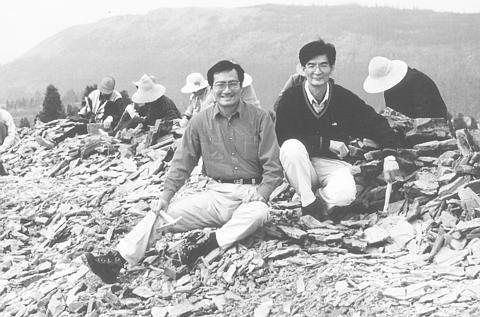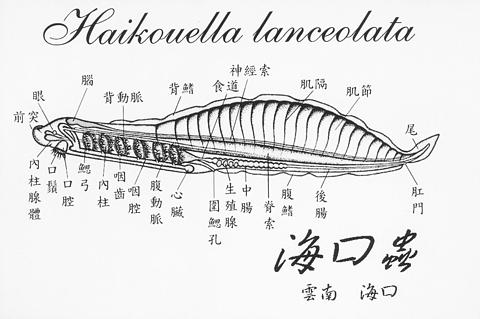A team of scientists from Taiwan and China appear to have ushered in a new era of studying human evolution on earth, after revealing a recent discovery in China of the fossilized remains of animal life forms believed to be a common ancestor among vertebrates.
The fish-like Haikouella (
The scientists said yesterday at a press conference in Taipei that their ten-member research team has discovered hundreds of Haikouella fossils preserved in excellent condition in southern China, and that the findings could well pave a new road in the story of the origin of later life forms, including humans.

PHOTO: LI CHIA-WEI
"We believe that these 530 million-year-old fish-like fossils could rewrite the book on the origin of vertebrate evolution (
Nature, a British-based science journal, will publish a five-page report in its issue due out today, regarding this major discovery made by Li, and his coworkers, including professor Chen Junyuan (3祐◆? and an assistant researcher Huang Di-ying (黃-}穎) from the Nanjing Institute of Paleontology and Geology in China.
Li said the discovery would also be included in the latest issue of the US version of the science periodical.

"We have discovered more than 300 fossil specimens in a small area, at Haiko, in Yunnan province. To memorialize the site where the extinct species was discovered, we named the ancestral vertebrate Haikouella," Li said.
Li said that although the fossils discovered are tiny -- between 2.5cm and 3.5cm in length -- details of their biological structure promise to be an inspiration to scientists.
"For the first time, we will be able, in exquisite detail, to trace vertebrates back to their invertebrate ancestors," Li said.
Showing slides of the fossils taken in Yunnan, Li pointed out that the Haikouella samples showed a clear line of evolution toward becoming vertebrates.
According to Li, the Haikouell is the first craniate chordate -- an animal form that featured a stiff rod (called a notochord) located above the gut and beneath a single, hollow dorsal nerve cord. They also had a distinct cranium.
"The discovery of the first craniate shows that the evolutionary history toward vertebrates had been on track long before the origins of the backbone," Li said.
As professor Chen pointed out in the report, due to the dearth of fossil evidence, human knowledge in the past had mistakenly assumed that the cephalization -- during which the head becomes the dominant body structure -- and full endoskeletonization -- when the body's superstructure is inside the body -- of vertebrates was a simultaneous development.
"Now, the Haikouella shows us that there is a prolonged history of cephalization before the origin of the backbone. The animals in the pre-backbone history that have a clear cranium, but no clear indication of endoskeletons or backbone, as "vertebrates" clearly transgress the manifest taxonomic principle of naming the organisms "vertebrates" based on the existence of a backbone," Chen wrote in the article.
Li, who holds a degree in biology from the University of California at San Diego, has been studying the mechanisms of biomineralization for years.
In 1998, Li and Chen jointly discovered fossils of embryos from the Precambrian era, millions of years before the evolutionary growth spurt known as the "Cambrian explosion." That discovery -- published simultaneously in separate reports in the most recent editions of Nature and Science -- looks set to rewrite the history of life on the planet. The discovery moved back the date of the earliest appearance of complex life forms on earth by 40 million to 50 million years.

Nvidia Corp yesterday unveiled its new high-speed interconnect technology, NVLink Fusion, with Taiwanese application-specific IC (ASIC) designers Alchip Technologies Ltd (世芯) and MediaTek Inc (聯發科) among the first to adopt the technology to help build semi-custom artificial intelligence (AI) infrastructure for hyperscalers. Nvidia has opened its technology to outside users, as hyperscalers and cloud service providers are building their own cost-effective AI chips, or accelerators, used in AI servers by leveraging ASIC firms’ designing capabilities to reduce their dependence on Nvidia. Previously, NVLink technology was only available for Nvidia’s own AI platform. “NVLink Fusion opens Nvidia’s AI platform and rich ecosystem for

‘WORLD’S LOSS’: Taiwan’s exclusion robs the world of the benefits it could get from one of the foremost practitioners of disease prevention and public health, Minister Chiu said Taiwan should be allowed to join the World Health Assembly (WHA) as an irreplaceable contributor to global health and disease prevention efforts, Minister of Foreign Affairs Lin Chia-lung (林佳龍) said yesterday. He made the comment at a news conference in Taipei, hours before a Taiwanese delegation was to depart for Geneva, Switzerland, seeking to meet with foreign representatives for a bilateral meeting on the sidelines of the WHA, the WHO’s annual decisionmaking meeting, which would be held from Monday next week to May 27. As of yesterday, Taiwan had yet to receive an invitation. Taiwan has much to offer to the international community’s

CAUSE AND EFFECT: China’s policies prompted the US to increase its presence in the Indo-Pacific, and Beijing should consider if this outcome is in its best interests, Lai said China has been escalating its military and political pressure on Taiwan for many years, but should reflect on this strategy and think about what is really in its best interest, President William Lai (賴清德) said. Lai made the remark in a YouTube interview with Mindi World News that was broadcast on Saturday, ahead of the first anniversary of his presidential inauguration tomorrow. The US has clearly stated that China is its biggest challenge and threat, with US President Donald Trump and US Secretary of Defense Pete Hegseth repeatedly saying that the US should increase its forces in the Indo-Pacific region

ALL TOGETHER: Only by including Taiwan can the WHA fully exemplify its commitment to ‘One World for Health,’ the representative offices of eight nations in Taiwan said The representative offices in Taiwan of eight nations yesterday issued a joint statement reiterating their support for Taiwan’s meaningful engagement with the WHO and for Taipei’s participation as an observer at the World Health Assembly (WHA). The joint statement came as Taiwan has not received an invitation to this year’s WHA, which started yesterday and runs until Tuesday next week. This year’s meeting of the decisionmaking body of the WHO in Geneva, Switzerland, would be the ninth consecutive year Taiwan has been excluded. The eight offices, which reaffirmed their support for Taiwan, are the British Office Taipei, the Australian Office Taipei, the